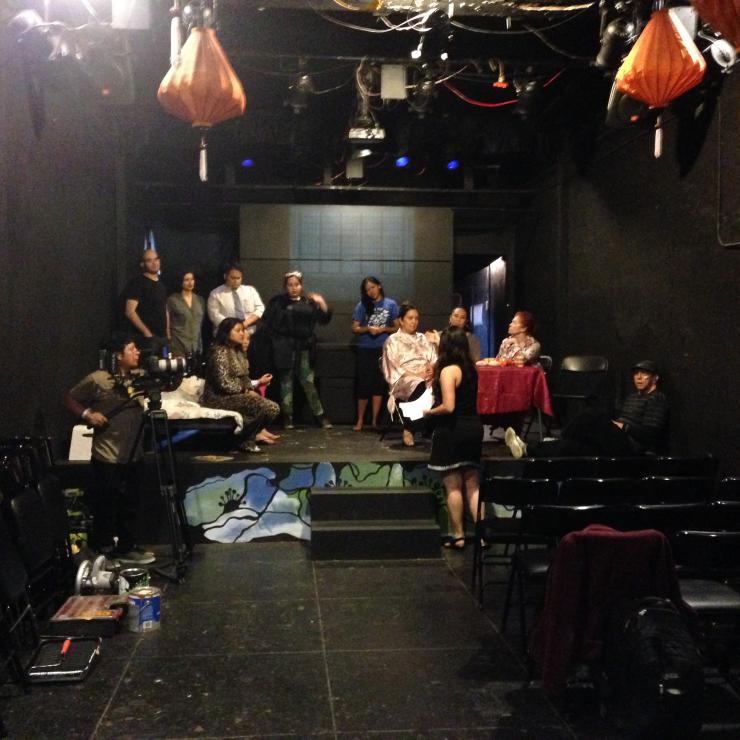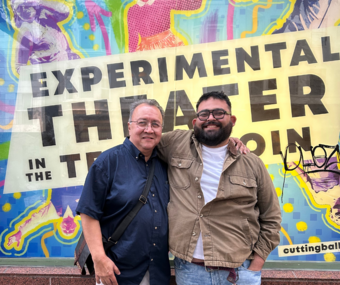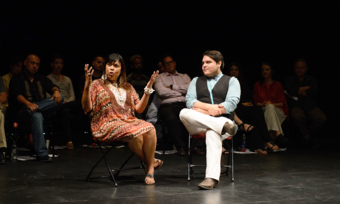Why Write Chicano?

Writing Chicano for the theatre should not be, in the words of Oscar Wilde, “a long, lovely suicide.”
I have a Master’s degree in English and, as a poet, have been published in mainstream journals. My transcript shows that I am capable of handling the English language like a pro. Yet I choose to write a significant portion of the dialogue of my plays in Chicano, despite the fact that it limits production opportunities and audience. Why?
My father grew up in a family of ten kids and not much food. At fifteen, he quit school because he didn’t have any shoes and the other kids were laughing at him over it. He falsified his birth certificate and joined the army. The next year he was getting shot at in Korea. He went to college on the G.I. Bill and took up the profession of computer programmer at Lockheed NASA while doing community service as a political activist. He was one of the ones-and-zeroes guys who put a man on the moon, yet the management of Lockheed Martin tried to fire him for being “not very smart,” in other words, a “stupid Mexican.” He asked to take an I.Q. test to challenge or validate their position, and came in one point below genius—not “stupid” enough to fire. In my childhood, he was on the mayor of Houston’s East End Advisory Council. I saw subsequent mayors call him by name and chat familiarly with him. Yet I also saw underclass Anglos calling him a “stupid Mexican” in gas stations, grocery stores, and restaurants, and I saw him wince and take it.
This showed me at an early age that greatness in Latinos is not welcome in the mainstream. It is not safe to be seen as an “uppity” Mexican. All cultural markers of Latinidad have to be infantilized. We were exemplified by the Frito Bandito, Cinco de Mayo, and the lady with the fruit on her hat. Even in college, the language departments hawked their wares: the German department by the philosophers Nietzche, Kant, and Heidigger; the French by the poetry of Baudelaire, the comedy of Molière, the novels of Camus and Sartre; while the Spanish department plugged a fiesta with guacamole. “Why can’t we be taken seriously?” was my lament.
In school, I acted in plays by Tennessee Williams, wrapped my tongue around that lyrical southern language whose cadences I could pronounce because they were all around me. It was different from other American playwrights’ work—Arthur Miller, William Inge, Lillian Hellman—because it wasn’t about those people you see on the New York stage. This was my first sense that theatre is ultimately local. After performances of my monologues at pubs and bookstores, people would come up to me and share experiences of their own about their Latino family and friends. Often they would express pleasure at hearing these voices on the stage, and would hand me their stories, freely, asking for no royalties, glad to have a worthy mouthpiece for a vibrant bit of life that had intersected with their own. There is a hankering for Latino voices, even in the mainstream, that should be filled by people whose genuine motivation is what Faulkner cited as the ultimate cause for art: “the human heart in conflict with itself.” Commerce is all well and good, and who can always turn down a nice hour or two of television at the end of the workday, but shiny mediocre vehicles for commercials don’t fundamentally feed the soul.
All cultural markers of Latinidad have to be infantilized. We were exemplified by the Frito Bandito, Cinco de Mayo, and the lady with the fruit on her hat.
Most artistic and literary directors of Anglo-run theatres select their programming as if they think Latinos mostly cut grass, raise white children, and bus dishes, and who wants to see more than a smattering of plays about them? Whenever I go to elegant restaurants, I see people who are clearly Latino spending hundreds of dollars on food and drink. They are polished and well-dressed. I want to go up and shake them and say, “Why weren’t you at my play?” Latinos have a high per capita participation in the performing arts. For example, according to a study by the Maricopa Partnership for Arts and Culture on Latino participation in arts and culture in Phoenix, “attendance at plays, opera, symphony, pops events and dance” is in the 10 to 15 percent range, while church- and school-based performing arts attendance is at 29 percent and 43 percent respectively. Our culture drives us to go to the ballet folklórico, the Fiestas Patrias, the Posada. We could be at the theatre in numbers if we could extend the sense of community obligation to this art form.
There are middle- and upper-middle income Latinos who would like our stories told. There are people who can afford the theatre tickets and appreciate all the theatre has to give. High art theatre does belong to us, as much as it belongs to the Anglos. The mainstream isn’t fully cognizant of this fact. The literature is clearly there, as the high honors that have begun to accrue to Latinos attests: Nilo Cruz and Quiara Alegría Hudes have won Pulitzer prizes; José Rivera has won an Obie; Octavio Solis has won the PEN Award.
While it is true that theatregoers are in the minority among Latinos, that minority is not as small as the mainstream theatre seems to think. And the Chicano population is growing along with Latino demographics in general. It is time that mainstream theatre acknowledged this fact, and time that we made a show of force by showing up.
The Chicano population is growing along with Latino demographics in general. It is time that mainstream theatre acknowledged this fact, and time that we made a show of force by showing up.
We need to change the image of theatre among our educated class. The place to start is college theatre, where raising money for a production and box office receipts are not issues. A theatre degree is a bit of a ponzi scheme. For most people, it is not going to result in making a living in the field, and as my Latino friends can attest, not even an Ivy League MFA keeps them out of the sinkhole of perpetual day jobs. But here we need to bring our demographics and the liberal bent in the university to bear on the problem. If we can build a good repertoire of college theatre plays by Latinos and shop them aggressively to colleges and universities with drama departments—bend their arms—and get out the word to Latino college students to get in the theatre and represent, present it as the one thing Chicanos are encouraged to do—political activism—we can cultivate the audience we need for the future.
A director friend who works in educational theatre gave me a tip about how playwrights can make money: write plays for colleges with lots of roles for young women. Most of the drama majors are female, most of the roles are male, and theatre departments are constantly on the prowl for plays they can use to hone the skills of their female acting corps.
Both women and Latinos are underrepresented in the dramatic literature being produced at every level, and we can cry about this, or we can storm the gates of opportunity by writing and by helping each other. The Latino vice of invidia is not going to get us anywhere. We need to let go of the scarcity mentality of thinking there are only so many slots for us. The truth is, there are no slots for us if we just cut each other. We need to stop giving each other the ojo and recognize that the problem is bigger than any one person’s career. Some of the most talented people in the field are, after decades, still deferring their dreams or martyring themselves. We need to treat this as evolution, where after vast periods of deep time things change. The plan has to extend into decades. Here we are planting orchards and vineyards in the expectation that our grandchildren will enjoy the fruit. We are headed for majority status in this country. We can save ourselves in the art form and perhaps the theatre itself by acting communally.












Comments
The article is just the start of the conversation—we want to know what you think about this subject, too! HowlRound is a space for knowledge-sharing, and we welcome spirited, thoughtful, and on-topic dialogue. Find our full comments policy here
I dare to suggest that the Latino population needs to be
educated in this type of entertainment. The community theaters can help by
producing well known musicals like Annie, Grease and Chicago in the Spanish language.
The mentioned works and other have been already produced in Mexico, Argentina
and other Latin American countries; therefore all the necessary material is
available. The process may not be easy to swallow, but the results can be
fantastic.
We have plenty of Latino playwrights doing fantastic work in the U.S.. Why would we want to do mainstream plays that are already being done by the mainstream theater? I ran a Latino theater company in Phoenix for ten years and we always produced Latino plays, and audiences came just fine. We don't need to do Annie, Grease nor Chicago. That completely invalidates the work of Latino playwrights and we're out there. We exist. We have published works and anthologies. Don't push us to the back of the bus.
I am
sincerely glad that your audience embraces the works you produce in the Spanish
language, and I wish you continued success. However, I am sure that not every
American city enjoys your type of achievement. Where I live there isn’t any
production of Latino works; the half a dozen of theaters in my area present
classical musicals. If there would be a market for original Latino works, these
theaters would be showing them from time to time. It would be easier to develop
the passion for theater, any kind, among the Latino community by letting them
experience the “main stream” works’ magic.
This is truly brilliant. Joanne, we met at the unfortunately titled Woman Playwrights Festival at ACT in Seattle many years ago. I remember you so well reading the tarot cards for us at Hedgebrook. You were a light then and are a light now. Thank you for this.